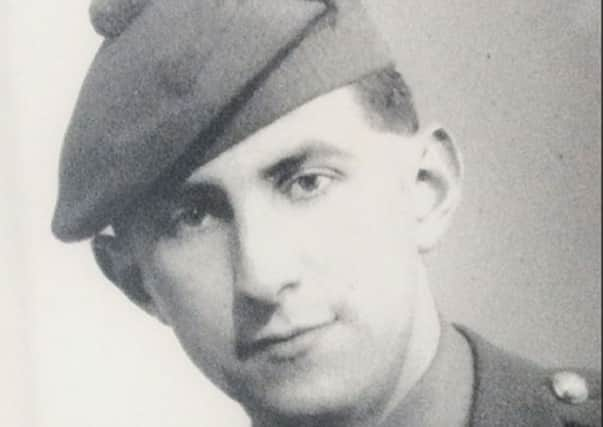Obituary: James Masson, soldier and forestry expert


Jim Masson was one of the few Argyll and Sutherland Highlanders to receive the gallantry award the George Medal for an act of great bravery not in the face of the enemy.
Although still a serving soldier, he won the honour for his bomb disposal work in Palestine the year after World War II ended – despite never receiving any formal training in defusing explosive devices.
Advertisement
Hide AdAdvertisement
Hide AdAt the time, Palestine was a British Mandate, festering with violence between Jewish and Arab factions and against the British. The contested area endured many terrorist attacks, including the bombing of Jerusalem’s King David Hotel, the headquarters of the British forces in Palestine, which left 91 dead in July 1946.
Three months later Lt Masson was on duty with a Sergeant Smith of the Palestine Police when there was a report of suspicious luggage in the waiting room of Jerusalem railway station.
The pair were soon on the scene where the suitcase had been planted by Irgun terrorists. The station was evacuated and Masson and Smith confirmed fears of another atrocity when they discovered the leather case was lined with steel.
Masson’s commanding officer, Brigadier David Wilson, recalled the incident in his memoirs, The Sum of Things, describing how soldier and policeman carried the suitcase to the car park together to decide what should be done. Smith courageously elected to deal with it himself. Masson protested but Smith said that, since Masson had dealt with the last booby trap, it was now his turn.
Tragically, the suitcase blew up and Smith was killed instantly. Brig Wilson nominated him for the George Cross but instead he was awarded a posthumous King’s Police Medal for gallantry. Lt Masson received the George Medal, the next highest award to the George Cross, which Wilson said was “nearly unique” among the Argylls. He was, he said, an excellent pioneer platoon commander, expert in sniffing bombs and dismantling them and who, together with Sgt Smith, saved many lives. “It can sometimes be easy to be brave when the blood is up and the battle is on,” he wrote, “but the cold-blooded courage of dealing alone with booby traps and high explosive is something very special. It was a privilege to have known such men.”
Masson, who had been commissioned into the Highland Light Infantry, but served with the Argyll and Sutherland Highlanders, received news of the honour after returning from a patrol of the Sinai Desert and enjoyed quite a celebration. He was presented with the medal by King George VI at Buckingham Palace in 1947, in between leaving the army and resuming his studies at Aberdeen University.
Decades later, he took part in a project for the regimental museum, Palestine: A Forgotten Conflict, telling his story and recalling his day at the palace when his appearance momentarily flummoxed the king.
“Having been with the Argylls, I was wearing Argyll service dress, but of course the citation reads your parent regiment i.e. the Light Infantry. To my horror, the king looked at the co-chairman and said ‘Would you read the regiment again please?’ He said ‘Highland Light Infantry.’ He looked me up and down and said ‘Transferred I see Lieutenant.’ I said ‘Yes.’
Advertisement
Hide AdAdvertisement
Hide Ad“He said ‘Are you still with us?’ I said ‘No’. He said ‘What are you doing?’ I said ‘Back at university, finishing my forestry degree and then I’m joining Your Majesty’s Colonial Forest Service.’ He stepped forward, shook my hand and said ‘The best of luck lieutenant.’”
Masson, who was born in Stonehaven and attended Dunnottar School, had embarked on a career in forestry at the suggestion of his science master at the town’s secondary school, Mackie Academy. His studies were interrupted by war service in 1943, when he was posted to Italy before going to Palestine, and he finally graduated BSc in 1949.
He began his forestry career as an assistant conservator of forests in Jos, Nigeria but over the next 35 years his work would take him all over the world.
During the 1950s he worked in provincial forestry offices in northern Nigeria but also spent a year at the Commonwealth Forestry Institute at Oxford University.
From 1960-62 he was conservator of forests for ten different Nigerian provinces before being recruited by the United Nations’ food and agriculture organisation. He spent 22 years with the UN working in such diverse locations as Sudan, Thailand, Rome, Cuba, Peru and Bangladesh.
He was on the Latin American desk in Rome when he retired, in 1984 – though that did not mark the end of his working life. He continued as a consultant, a role that took him from the Philippines, to Trinidad and Tobago, Sierra Leone, Australia and Egypt.
In his early days in Nigeria he was accompanied by wife Sheena, a Greenock girl with whom he had had a holiday romance after meeting at a dance in Stonehaven Town Hall. They married in 1953 and went on to have three girls.
Prudently deciding their children’s education would suffer if they accompanied him to each posting, they bought a house in Gourock in 1962 and from then on the girls and their mother would holiday with him in exotic locations including Sudan, Rome and Burma.
Predeceased by his daughter Joan, Masson, who was widowed last year, is survived by his daughters, Sine and Morag, six grand-children and one great-grandchild.